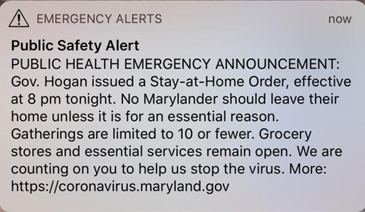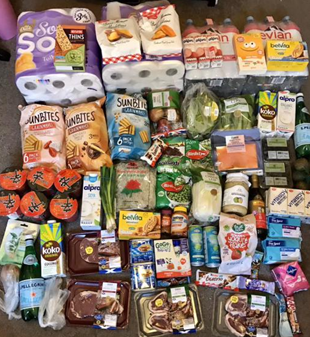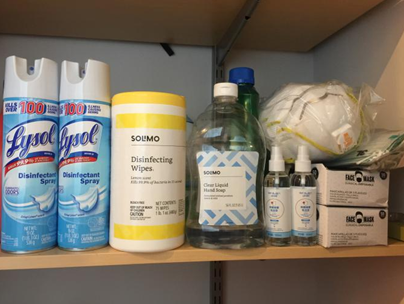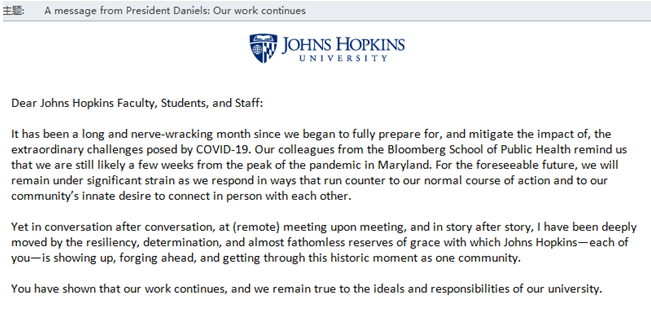

On March 11, the World Health Organization declared the coronavirus outbreak a pandemic. Five days later, the White House issued a guideline that required citizens to work and study from home, avoid gatherings of more than 10 people and discretionary travel. It seems that we have become involved in a war against the pandemic before we are even ready.

People cancel traveling plans and stay at home
I had planned to travel to California during the Spring break. However, as California became a severely-hit state in America amid the epidemic, I was forced to cancel the trip, as were many people around me.
Public places such as restaurants and bars were shut down and recreational and religious activities and weddings were required to be held online. Many states have asked citizens to participate in the presidential primary elections via e-mail.
During the National Cherry Blossom Festival in Washington, D.C. held from the end of March to the beginning of April, people usually take part in the parade, enjoy the blossoms and have picnics with family and friends. This year, however, the festive mood was nowhere to be found.
Foreign students store up food and try to keep themselves amused

In order to avoid physical contact with other people, we would order our daily necessities from supermarkets and have them delivered to our homes.
American supermarkets were open as usual, but occasionally suffered from a shortage of goods. Our orders were often replaced or cancelled due to lack of stock. Luckily, the food could basically meet daily living needs.
Due to too many orders and deliveries, some supermarkets are only open for a certain period, and not all day. Amazon has hired twice as many deliverymen as usual to meet the increasing demand.
Hygiene products are scarce amide the pneumonia outbreak. Articles like toilet paper, liquid hand soap and disinfectant wipes are still in short supply.

We have already stored rice, noodles, eggs, milk, vegetables, fruits and other food and daily necessities to prepare for a protracted war against the epidemic.
While staying at home, many Chinese students in America have taken up hobbies to pass the time. The Chinese Students and Scholars Association (CSSA) of the university has also organized online activities such as singing contests to enrich our lives.
Students take online courses amid the pneumonia outbreak

Many universities in the U.S. have rolled out online courses, including the Johns Hopkins University.
The university has closed its libraries and study rooms and required staff members at the offices related to student affairs to work through the online platform. A number of events have either been cancelled or held online instead, including academic lectures, themed forums and even the graduation ceremony for the spring semester.
The hospital and welfare center at the university will provide assistance for the students, with the cost of treatment to be reimbursed through medical insurance.
Motherland gives out medical supplies to students overseas

The overseas students are not alone in the fight against the novel coronavirus. On March 18, Cui Tiankai, Chinese ambassador to the U.S., spoke with student representatives in America online, giving advice on whether they need to come back to China amid the epidemic and giving them a boost of confidence.
At the beginning of April, China put together 500,000 packages of medical supplies for students abroad. My Chinese classmates and I have all received these kind parcels from the motherland.

China is a pillar of support behind all of us overseas students, and we hope the epidemic will be defeated soon and the world will return to normal.
Xie Xiaofan is a postgraduate student at the Johns Hopkins University
 Fire brigade in Shanghai holds group wedding
Fire brigade in Shanghai holds group wedding Tourists enjoy ice sculptures in Datan Town, north China
Tourists enjoy ice sculptures in Datan Town, north China Sunset scenery of Dayan Pagoda in Xi'an
Sunset scenery of Dayan Pagoda in Xi'an Tourists have fun at scenic spot in Nanlong Town, NW China
Tourists have fun at scenic spot in Nanlong Town, NW China Harbin attracts tourists by making best use of ice in winter
Harbin attracts tourists by making best use of ice in winter In pics: FIS Alpine Ski Women's World Cup Slalom
In pics: FIS Alpine Ski Women's World Cup Slalom Black-necked cranes rest at reservoir in Lhunzhub County, Lhasa
Black-necked cranes rest at reservoir in Lhunzhub County, Lhasa China's FAST telescope will be available to foreign scientists in April
China's FAST telescope will be available to foreign scientists in April "She power" plays indispensable role in poverty alleviation
"She power" plays indispensable role in poverty alleviation Top 10 world news events of People's Daily in 2020
Top 10 world news events of People's Daily in 2020 Top 10 China news events of People's Daily in 2020
Top 10 China news events of People's Daily in 2020 Top 10 media buzzwords of 2020
Top 10 media buzzwords of 2020 Year-ender:10 major tourism stories of 2020
Year-ender:10 major tourism stories of 2020 No interference in Venezuelan issues
No interference in Venezuelan issues
 Biz prepares for trade spat
Biz prepares for trade spat
 Broadcasting Continent
Broadcasting Continent Australia wins Chinese CEOs as US loses
Australia wins Chinese CEOs as US loses